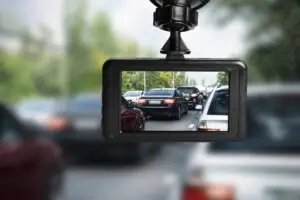
Dashboard cameras, otherwise known as dash cams, have become a popular tool for drivers across the United States. Many people find comfort in knowing that the events leading up to and during an accident may be recorded. While dash cam footage can be an additional source of information regarding your car accident, other factors may come into play when deciding if it is admissible in court.
Your first step should always be to contact a North Charleston car accident lawyer with Shelley Leeke Law. You can discuss the case details, and they can help you determine if this is an appropriate route for your specific case. If it is determined to be a promising avenue, your lawyer may help with the next steps to get your dash cam footage admitted as evidence.
Obtaining Dashcam Footage
The legality of dash cams varies by state. In South Carolina, drivers can have dash cams as long as they are mounted to the dashboard only. Dash cams should not block the driver’s view in any way.
If you are the owner of the dashcam footage, the police and your attorney may ask for it. The chain of custody may need to be established and authenticity verified. Tech professionals may be able to do this.
If you do not own the video footage and it is in the possession of another party, please let your attorney know as soon as possible. They may be able to subpoena this footage to ensure you can access it. From there, your attorney may argue its authenticity or inauthenticity if there is concern that the other party altered the footage in their favor.

The Role of Dash Cam Footage in Your Car Accident Lawsuit
Dash cam footage can be a key piece of evidence in any case. It provides an objective record to reference. This objective reference can confirm the chain of events and prepare witnesses to speak about it in court.
Benefits of Having Dash Cam Footage
If you are the victim of a car accident, dash cam footage can help you support your case. It may help your lawyer build and present a strong claim during the negotiation process. In addition, having a dash cam can aid you in cases of hit-and-run accidents.
If a car hits you and leaves the scene, you may have footage of the tag to assist in identification. Hit-and-run accidents are notoriously challenging, forcing injured motorists to rely on their own insurance. However, dashcam footage can aid police in locating the responsible party.
Risks in Having a Dash Cam
While dash cam footage may help tremendously if you are the victim, it can hurt your case if it shows that you may have contributed to your accident. South Carolina is a modified comparative negligence state. This means that your compensation may be reduced by the amount of liability you are found to have as long as it is less than 50%.
Comparative Negligence Laws
Comparative negligence considers the responsibility of all parties. For example, suppose someone ran a red light and t-boned you, but you were speeding. Running the red light is the apparent issue, but you may not have been hit if you had been going the speed limit.
In this scenario, you may be determined to be 10% responsible for your actions. The other party is 90% responsible. If you were awarded 100,000 in compensation, it would be reduced by your liability of 10%, leaving you with $90,000.
South Carolina’s negligence laws may have a profound impact on the value of your claim. To determine the role of dash cam footage in your accident, speak to a car accident attorney today. At Shelly Leeke, our injury lawyers have years of experience helping people recover the compensation they deserve.
Be Honest with Your Car Accident Attorney
If you have dash cam footage, you should notify your lawyer immediately. If you suspect that someone else may have footage, notify your attorney and give them whatever contact information you can. Your lawyer may then be able to subpoena the footage to aid in your case.

Your Dash Cam Footage in Court
Ultimately, your footage will likely be allowed in court if they can ensure that the recording is of the appropriate date and time and has not been tampered with. This can be a complicated issue, so you should speak with your attorney before handing it over to anyone or deleting it. It should not be deleted if you or your attorney have received a subpoena.
Ideally, you won’t have to take your case to court and can reach an agreement that is fair to everyone outside the courtroom. If you do find yourself at a trial for the case, make sure you have been forthcoming with your attorney so there are no surprises. If you have any other questions or concerns about your South Carolina car accident, reach out for a free consultation.







